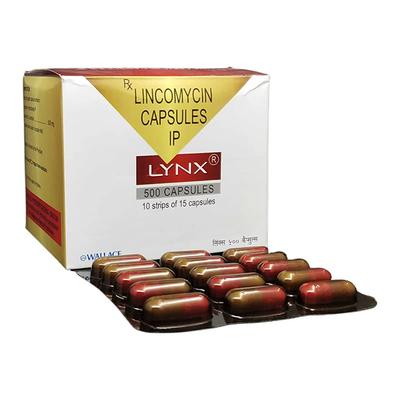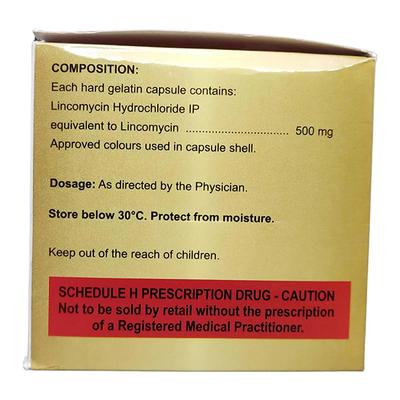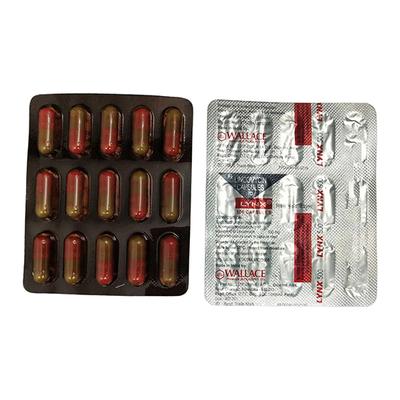

Netmeds First Membership
Quick Links
Introduction About LYNX 500MG CAPSULE
LYNX 500MG CAPSULE contains Lincomycin which belongs to the group of medicines called Lincosamides. LYNX 500MG CAPSULE is used to manage the infections caused by susceptible strains of gram-positive bacteria (such as streptococci, pneumococci, staphylococci), and/or susceptible strains of anaerobic bacteria in affected individuals.
LYNX 500MG CAPSULE is also used to manage upper respiratory infections (including tonsillitis, pharyngitis, otitis media, sinusitis, scarlet fever), lower respiratory infections (including acute & chronic bronchitis, pneumonia), and skin & soft tissue infections.
LYNX 500MG CAPSULE is also indicated for use to manage bone & joint infections (including osteomyelitis, septic arthritis), septicaemia (life threatening complication of an infection), endocarditis (inflammation of heart valve), and bacillary dysentery.
LYNX 500MG CAPSULE is not recommended for use in patients allergic to lincomycin, and/or clindamycin. It is also not recommended for use in patients suffering from meningitis (inflammation of membranes surrounding brain and spinal cord).
Before taking LYNX 500MG CAPSULE, inform your doctor if you have diarrhoea, liver problems (such as impaired hepatic function), and/or kidney problems (such as severe kidney impairment).
LYNX 500MG CAPSULE should be used with caution in pregnant and breastfeeding women only if it is clearly necessary.
LYNX 500MG CAPSULE should be taken with caution in children and adolescents (aged above 1 month to 18 years) and is advised to be used with caution in elderly patients (aged 65 years/above) after consulting the doctor.
The most common side effects of taking LYNX 500MG CAPSULE are diarrhoea, nausea, and/or vomiting. Consult your doctor if any of these side effects worsens.
Uses Of LYNX 500MG CAPSULE
- Manage infections caused by susceptible strains of gram-positive bacteria (such as streptococci, pneumococci, staphylococci), and/or susceptible strains of anaerobic bacteria.
- Manage upper & lower respiratory infections
- Manage skin & soft tissue infections.
- Manage bone & joint infections (including osteomyelitis, septic arthritis), septicaemia, endocarditis, and bacillary dysentery in affected individuals
How LYNX 500MG CAPSULE Works
LYNX 500MG CAPSULE works by binding to bacterial genetic material (RNA) and cause inhibition of synthesis of certain essential proteins in bacteria which leads to its destruction and manage its spread to other parts of the body thus managing infections caused by susceptible bacteria in affected individuals.
How to use LYNX 500MG CAPSULE
Take LYNX 500MG CAPSULE as advised by your physician. Swallow the medicine with a glass of water. Do not crush or chew the medicine. Your doctor will decide the correct dose and duration for you depending upon your age, body weight and disease condition.
Side Effects Of LYNX 500MG CAPSULE
Common
- diarrhoea, nausea, vomiting
Rare
Stop taking LYNX 500MG CAPSULE and consult your doctor immediately if you are experience any of the following side effects:
- severe hypersensitivity (immune mediated allergic) reactions such as anaphylactic reactions associated with symptoms like cough, itch, rash, and/or shortness of breath
- severe skin reactions such as Stevens-Johnson syndrome, toxic epidermal necrolysis, acute generalised exanthematous pustulosis, and/or erythema multiforme
- severe/persistent diarrhoea
- changes in urine output
- swelling of hands/eyes/throat
- yellowing of skin/eyes
How To Manage Side Effects
Diarrhea:
Drink plenty of water and stay hydrated. Try to avoid taking any medicine on your own to manage diarrhea. Consult and inform your doctor if the symptom worsens.
Nausea and vomiting:
Take LYNX 500MG CAPSULE with or just after a meal. Stick to simple meals. Avoid eating oil rich or spicy foods, sugary snacks and drinks. Avoid drinking too much liquid along with your meals, drink slowly in between meals. Inform your doctor if the condition worsens.
Warning & Precautions
Pregnancy
LYNX 500MG CAPSULE should be used with caution during pregnancy only if it is clearly necessary. Consult your doctor before taking LYNX 500MG CAPSULE.
Breastfeeding
LYNX 500MG CAPSULE should be used with caution in breastfeeding women since as it may pass through breast milk. Consult your doctor before taking LYNX 500MG CAPSULE.
Driving and Using Machines
Do not drive/operate machines if LYNX 500MG CAPSULE affects your ability to drive/operate machines.
Kidney
LYNX 500MG CAPSULE should be used with caution in patients with severely impaired kidney function. Consult your doctor before taking the medicine.
Liver
LYNX 500MG CAPSULE should be used with caution in patients with liver problems such as impaired hepatic function. Consult your doctor before taking the medicine.
Allergy
Do not take LYNX 500MG CAPSULE if you are allergic to lincomycin, clindamycin, and/or any other ingredients of this medicine.
Others
LYNX 500MG CAPSULE is not recommended for use if you:
- have meningitis (inflammation of membranes surrounding brain and spinal cord).
Before taking LYNX 500MG CAPSULE, inform the doctor if you:
- have diarrhoea.
Use in Paediatrics:
LYNX 500MG CAPSULE should be used with caution in children and adolescents (aged above 1 month to 18 years). Consult your doctor before administering the medicine to the child.
Use in Geriatrics:
LYNX 500MG CAPSULE should be used with caution in elderly patients (above 60 years). Consult your doctor before receiving.
Interactions
A. Drug - Drug interactions
Before taking LYNX 500MG CAPSULE, inform your doctor if you are taking any of the following medicine:
- erythromycin (used to manage bacterial infection)
- neuromuscular blocking agents (medicines used to relax muscles) Ex. pancuronium, vecuronium.
Overdosage:
If you or anyone else accidently take too much of LYNX 500MG CAPSULE, consult your doctor immediately or visit the nearby hospital if you experience any unusual symptoms.
Synopsis
| Drug | : | Lincomycin |
| Pharmacological Category | : | Lincosamide |
| Therapeutic Indication | : | Bacterial infections (caused by susceptible gram positive and anaerobic bacteria), Upper & Lower respiratory infection, Skin & Soft tissue infection, Bone & joint infection, Septicaemia, Endocarditis, Bacillary dysentery |
| Dosage Forms | : | Injection, Capsule |
More Information
- Keep LYNX 500MG CAPSULE out of reach of children
- Store LYNX 500MG CAPSULE below 30°C
FAQs About LYNX 500MG CAPSULE
What is LYNX 500MG CAPSULE used for?
LYNX 500MG CAPSULE is used to manage infections caused by susceptible strains of gram-positive bacteria (such as streptococci, pneumococci, staphylococci), and/or susceptible strains of anaerobic bacteria which is also used to manage upper & lower respiratory infections, and skin & soft tissue infections. The medicine is also indicated for use to manage bone & joint infections (including osteomyelitis, septic arthritis), septicaemia, endocarditis, and bacillary dysentery in affected individuals.
What are the common side effects of taking LYNX 500MG CAPSULE?
The most common side effects of taking LYNX 500MG CAPSULE are diarrhoea, nausea, and/or vomiting. Consult your doctor if any of these side effects worsens.
How LYNX 500MG CAPSULE works?
LYNX 500MG CAPSULE works by binding to bacterial genetic material (RNA) and cause inhibition of synthesis of certain essential proteins in bacteria which leads to its destruction and manage its spread to other parts of the body thus managing infections caused by susceptible bacteria in affected individuals.
How LYNX 500MG CAPSULE should be taken?
Take LYNX 500MG CAPSULE as advised by your physician. Swallow the medicine with a glass of water. Do not crush or chew the medicine. Your doctor will decide the correct dose and duration for you depending upon your age, body weight and disease condition.
Can LYNX 500MG CAPSULE be used in pregnant and breastfeeding women?
LYNX 500MG CAPSULE should be used with caution in pregnant and breastfeeding women only if it is clearly necessary. Consult your doctor before taking LYNX 500MG CAPSULE.
References
1. KD. Tripathi. Macrolide, Lincosamide, Glycopeptide and Other Antibacterial Antibiotics; Urinary Antiseptics. Essentials of medical pharmacology. Seventh edition. 2019. Page:757.
2. Lincomycin. NIH National Library of Medicine. National Centre for Biotechnology Information. PubChem. June 2022. [Accessed on 24th June 2022] https://pubchem.ncbi.nlm.nih.gov/compound/Lincomycin
3. D A Leigh, K Simmons. Effect of clindamycin and lincomycin therapy on faecal flora. NIH National Library of Medicine. National Centre for Biotechnology Information. PMC PubMed Central. May 1978. [Accessed on 24th June 2022] https://www.ncbi.nlm.nih.gov/pmc/articles/PMC1145300/
4. GreenField Pharma. National Agency for Food and Drug Administration and Control (NAFDAC). [Revised on February 2018] [Accessed on 24th June 2022] https://www.nafdac.gov.ng/wp-content/uploads/Files/SMPC/a_v6/SMPC-LINCOCLIM.pdf
5. AdvaCare Pharma. LincoCare Capsules. [Accessed on 24th June 2022] https://www.advacarepharma.com/en/pharmaceuticals/lincomycin-capsules
6. Arterium Corporation. Lincomycin. [Accessed on 24th June 2022] https://www.arterium.ua/en/medications/rx+otc/77
Useful Diagnostic Tests
- liver and kidney function test









